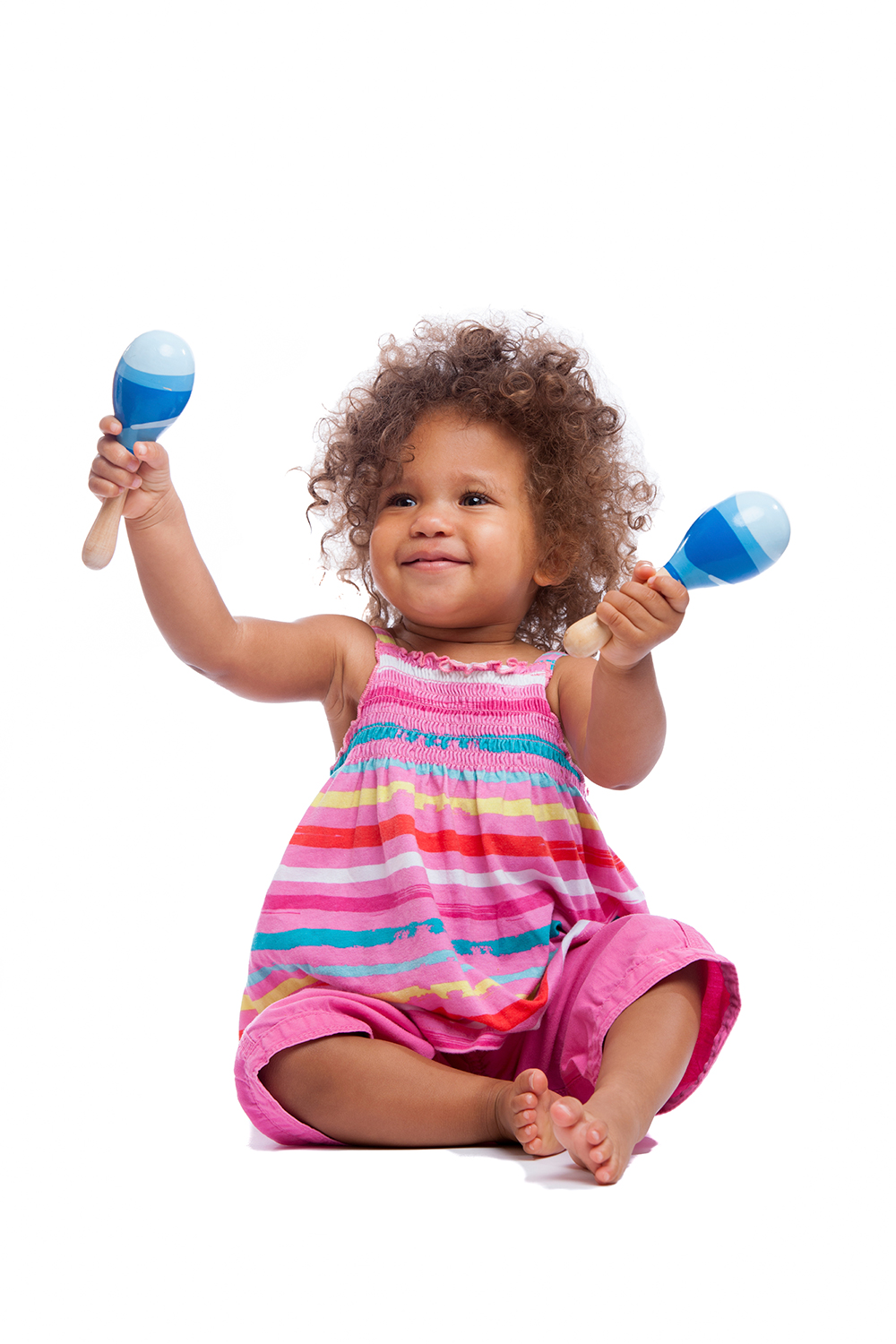
Is your baby the next Mozart? While unlikely — the nearly superhuman Mozart achieved fame as a violinist, pianist and composer all by the age of 5 — most children are born with incredible musical abilities that eclipse those of adults.
Nurturing these abilities will spur your baby’s social, intellectual and emotional growth.
“Children deserve the opportunity to develop all their sensory capacities, in order to live their lives to the fullest,” says Patricia Shehan Campbell, professor of ethnomusicology at the University of Washington (UW) and an expert in children’s music. “The sounds that surround them stimulate their listening ears, and the musical expressions they experience are pathways for understanding the world in which they live.”
Making music is a social activity that encourages bonding, aids in a child’s intellectual growth and helps her learn and share emotions. The earlier you get started, the better — you don’t even need any talent or equipment! In fact, you’re probably already helping your child become more musical, whether you know it or not.
Music and language
We’ve all been guilty of using a singsongy voice when talking to baby. It turns out, however, that lilting manner of talk might be good for your little one.
“Singing is slower than speaking and very deliberate, so babies hear the words and the order in which they come more clearly when we sing,” says Allison Butler, director of education for Joyous Noise Studio, which has six locations in the Seattle area. “The rhythmic patterns and the intervals catch and hold a baby’s attention and engage him or her more fully than speaking alone.”
It doesn’t matter what you sing, only that you do so. Singing helps infants pick up on important features of spoken language. Many song lyrics are written in grammatically correct, complete sentences, while music’s repetitive structures reinforce important words. Even when you speak normally, the rhythm and tone of your voice convey important information about the intention behind your words.
That’s why any song will help your baby better understand the world. “If you don’t know many songs, make them up,” says Butler. She suggests using popular Christmas carols or hymns that you know well and changing the lyrics. “New words about diapers and mushy rice cereal do quite well.”
Music and intellectual growth
Listening to music does more than engage your baby; it introduces him to patterns of repetition and variation. Infants, says University of Toronto psychologist Sandra Trehub, are good at making judgments about musical sounds. They can, for example, recognize when a melody raises or lowers all the notes at a consistent value.
Infants can also readily differentiate between notes that are at least a halfstep apart — from a white key to the adjacent black key on a piano, for example. They show a preference for consonance (combinations of notes that sound pleasant) as opposed to dissonance (combinations that sound harsh); some will even show discomfort when they hear dissonance. Similarly, infants tend to prefer happy music (upbeat and in major keys) to sad music (slower and in minor keys).
As babies become more familiar with a particular song or style, they start to predict what will come next. Music provides a safe testing ground for our predictive abilities, says Ohio State University music theorist David Huron, and it teaches us to keep a steady beat — an important life skill.
“Keeping a steady beat is a time-management skill,” explains Butler of Joyous Noise. “Walking, crawling and running are all done to a specific beat — usually the child’s internal steady beat. There are many fine motor skills that are linked to the ability to keep a steady beat, too, such as cutting with scissors and writing smoothly.”

Music and emotion
Even in the womb, a child becomes accustomed to sensations associated with particular emotional states. The mother’s voice, heartbeat, digestion and walking speed offer physical cues to emotional states through pitch and rhythm, says Richard Parncutt, an Australian professor of music cognition.
At birth, however, infants possess very few emotions themselves, say Emery Schubert and Gary E. McPherson, both also Australian professors of music cognition. It’s during the first year of life that babies acquire many of the emotions, such as happiness, sadness, anger, joy and fear, that are necessary for survival. Music plays an important role in that development.
Schubert and McPherson suggest that while an infant’s musical brain is still underdeveloped in many respects, it is sophisticated enough to extract meaningful emotional cues from music, particularly when paired with the pitch and rhythm of spoken language.
“By learning to listen,” says Campbell of the UW, “children grow more deeply engaged in what it means to be human. Music is a means of social and self-definition, a bridge for young children from the self to others.”
Music and you
Developing your baby’s musical sensibilities is easier than it sounds. Give these tips a spin.
- Hit play. Listen regularly to music, in the car, at meals and at bedtime. Even playing in the background, music provides baby with plenty to enjoy.
- Let your baby rock out. Let baby make her own music. Simple instruments such as rattles and tambourines (or pots, pans and a wooden spoon) allow children to explore cause and effect while expressing themselves.
- Don’t play conductor. Refrain from showing your baby how to make music. Don’t take his hand and bounce the instrument up and down, for example. That will just make him feel confined.
- Have a little fun. Get into it! Move to the music and move your baby, too. Bounce, dance, sway, walk or rock to whatever you’re listening to. Tap your baby along with the beat; this will help her internalize it.
- Broadcast global tastes. Expose your baby to a wide variety of music. Tunes ranging from those of Caspar Babypants to Buddy Holly to, yes, our old friend Mozart can provide young listeners with new listening experiences.











